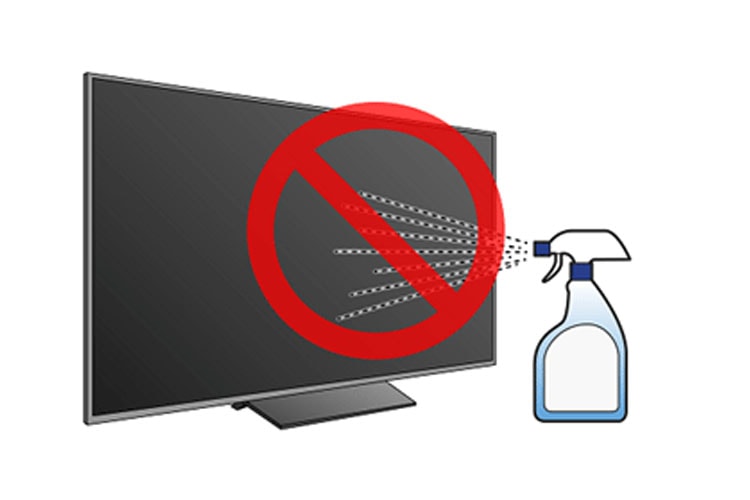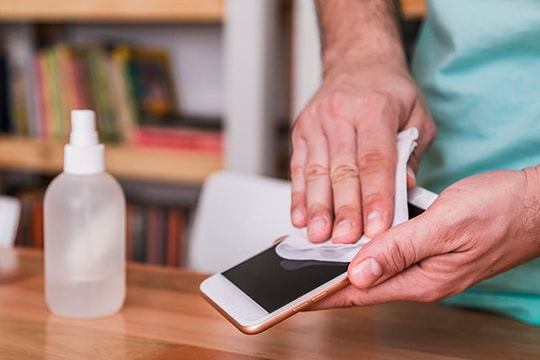Tips for cleaning TV screens properly to avoid unfortunate risks
Cleaning a TV screen may seem like a simple task, but with just one wrong move or using the wrong type of solution, you can scratch your expensive TV, damage the anti-glare coating, and sometimes permanently damage it.
Modern TVs, from LED to OLED to QLED to 4K, use screens that are extremely fragile and sensitive to mechanical and chemical stress. Unlike regular glass or phone screens, the anti-reflective coating and the liquid crystal layer underneath the TV screen can be easily damaged if handled incorrectly.
Many people have the habit of using what is available at home, from glass cleaner to paper towels to clean the screen. However, this is the cause of scratches, damaged coating, or even shorten the life of the TV without knowing it.

The important thing to remember when cleaning your TV screen is to avoid liquids containing strong detergents, be gentle and say no to common chemicals. A microfiber cloth is the best tool to protect your TV screen from dirt and dust while still being absolutely safe.
TV cleaning instructions from themajor manufacturers
LG:Clean the screen gently
LG recommends cleaning the screen with only a soft, dry cloth. The most important goal is to avoid scratches. You should wipe in gentle circular motions, which allows you to reach each point on the screen from multiple angles in one stroke.
Important Note:Never use substances such as alcohol, thinner or benzene, as they can corrode the protective coating. And never spray water directly onto the screen, as there is a real risk of electric shock and damage to the device.
Samsung: Patient and thorough
Meanwhile, the manufacturer Samsung gives a more detailed process:
- Turn off the TV and let it cool for a few minutes before unplugging it.
- Use a microfiber cloth to gently wipe the frame and screen. Do not press hard as the screen can easily crack or break with strong force.
- If the screen has stubborn stains, spray a small amount of distilled water onto a cloth and wipe. Never spray water directly onto the TV.
- Let the TV dry completely before plugging it back in.
Things to absolutely avoid:Glass cleaners, soaps, solvents such as alcohol, ammonia, benzene, acetone, as well as paper towels, rough cloths or sandpaper. All can scratch or damage the anti-reflective coating.
Sony: Flexible with "tough" stains
Sony also recommends using a soft, dry cloth to clean the screen. In special cases, such as oil-based ink stains, a non-soap synthetic detergent diluted to less than 1% with water can be used.
Soak the cloth, wring it out thoroughly to remove excess liquid, and then gently wipe the area to be treated. Then wipe again with a dry cloth.
However, Sony warns against using too much force, as the screen crystals may break, causing the image to distort or appear as dust. This can be temporarily fixed by turning the power off and on again, but long-term damage is inevitable.
Should I use a specialized screen cleaner?
There are many types of cleaning solutions for TV screens, laptops, and phones on the market today. Most of them contain distilled water (about 99%) and a small amount of safe additives.
Many experts rate these products as quite effective, especially on stubborn or greasy stains, and they often come with a good quality microfiber cloth.

Be selective, though. If the product label doesn’t say “alcohol-free” or “ammonia-free,” it’s best to stay away. These chemicals can seriously damage the protective coating on your screen.
And a good rule of thumb is to only use a specialized cleaner if you absolutely have to. In most cases, a microfiber cloth and distilled water will be more than enough to keep your TV screen sparkling.
Common mistakes and their unintended consequences
Use a tissue or regular face towel:It is easy to cause small scratches, but over time it will accumulate and cause the screen to become blurry or have patchy light.
Spray water directly onto the TV:In addition to the risk of electric shock, this can also cause water to seep into the gaps, damaging internal components.
Using window cleaner:While it may make the glass clear, it will corrode the anti-glare coating of the TV screen.
Press firmly when wiping:Can cause “dead pixels”, distorting the image or creating permanently dark areas.
In short, cleaning your TV screen is something you should do regularly, not only to maintain its aesthetic appeal but also to protect your eyes and prolong the life of your device. However, approach it as a delicate operation that requires gentleness and proper technique.
Don’t let a seemingly simple cleaning task cost you thousands of dollars to replace your screen, or worse, buy a new TV. A clean microfiber cloth and a little care can save you from unnecessary trouble.



.jpg)


